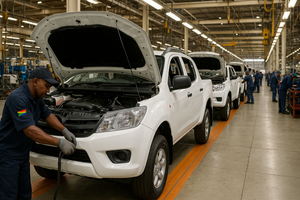What should South Africa do with its car industry, particularly in the face of the likelihood of new import tariffs and an enormous shake-up in the industry with the advent of electric vehicles (EVs)? The question is so huge and important, it goes way beyond the scope of this little business reflection. But I do have one thought – perhaps an obvious one – and that is that South Africa should embrace EVs with real aggression.
Americans often make the point about their own industry that it’s like a doting parent with a misbehaving child – always bailing them out but still bragging about them over the supper table. The same sort of dynamic applies to the local motor industry. For some reason it’s the one sector in South Africa that has significant government support, even though it’s almost entirely foreign owned.
The reason for that can also be expressed in a different analogy – possibly the same one that many countries have with their motor industries; it’s like a bad marriage that has somehow lasted too long: nobody’s happy but divorce would be economically devastating.
People are fascinated with the motor industry for good reason. It’s the third-largest sector in most developed countries by employment, behind retail and healthcare, and it contributes much more than people think to industrial R&D. But actually, its contribution to GDP is tiny at about 3%, barely larger than the media sector.
So, why does it garner such a high level of attention? Partly because it intersects with so many related concepts: economics, culture, politics and technology. Partly because it constitutes the end point of a truly extraordinary supply chain. Cars need steel, rubber, electronics, AI, software, rare earths, plastics and all kinds of other stuff. It’s like a microcosm of global industry.
And because it’s such a microcosm, it’s an aspirational industry for developing countries. Korea really arrived as a developed country in the minds of people around the globe when the world started buying Korean cars at meaningful levels. It’s a very “national champion” kind of industry, and Germany and Japan are perhaps the best examples, both with signature brands such as Volkswagen and Toyota, among many others.
In South Africa’s case, the motor industry is a great example of how realistic, engaging and innovative thinking both by the industry and by the government can create a win-win solution. And in the motor industry’s case, the really remarkable thing is that this constantly updated system spanned both the old apartheid government and the new democratic government in substantially the same format. The result is that South Africa hosts a robust automotive manufacturing sector, with nine major vehicle assembly plants operated by global original equipment manufacturers (OEMs) all over the country.
But there are two problems with the win-win. First, the winners are the government and the industry, and that excludes the consumer. The second problem is that it’s really based on a system of high tariffs on South Africa’s side, and low tariffs on the side of importers. And that is going to end soon.
Just as an example, I was recently, just for fun, following the international release of BYD’s bakkie called the Shark. It’s a plug-in hybrid, mid-size pick-up, and it debuted in Mexico about this time last year. It’s interesting because it was the global vehicle debut launch of China’s biggest carmaker outside of its home state.
The bakkie was recently released in Australia, which interestingly decided to dump its entire domestic motor industry. For years Australia had propped up its carmakers (Holden, Ford, Toyota) with billions in government subsidies, but in 2017 it stopped doing so, and soon after Ford, GM and Toyota announced their exit.
So, because there is no domestic industry in Australia, there are also no tariffs imposed on importers, because there is no domestic industry to protect. The result is that the Shark, which was released in Oz recently, is retailing at A$58,000, which is about R685,158. The Shark has also just been launched in South Africa, and guess what the retail price is? The Shark 6 Premium is currently priced at R959,900, which is in the higher bracket for a bakkie. The difference is not because BYD is gouging; it’s just that the tariffs to protect local OEMs boost the price by almost exactly the proportion of the tariff – that would be a face-ripping 25%.
Think for a moment what that means. It means the South African consumer is being screwed. It means Chinese car producers are being screwed. It means the development of EVs is being crippled. That’s a lot of screwing! We, consumers, are subsidising the party, missing the ride and still picking up the tab.
There is that old saying that you should never let a good crisis go to waste. South Africa’s tariff structure is anyway going to be revised, given the proclivities of the big orange over the sea. South Africa could do a lot worse than look carefully at its motor industry plan and adapt it for a new era. DM
his post first appeared in the Daily Maverick. To signup for Daily Maverick's other fabulous newsletters, click below.
Please do forward this post to anyone who might be interested, and by all means ask them to include their email below to become a 💥 free 💥 subscriber. Till next time.



Join the conversation